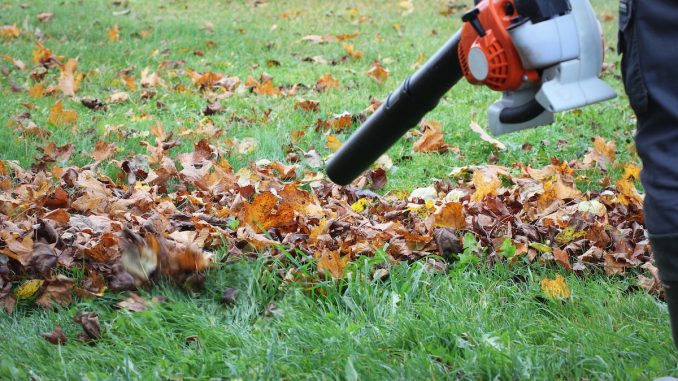
At their final board meeting of 2023 last week, Greenport officials heard from residents about what the community described as the scourge of gas-powered leaf blowers.
One resident compared them to “a swarm of enormous mosquitoes that has taken over the neighborhood,” saying that “I can’t swat them, I can’t make them go away — I am stuck listening to this noise for hours and hours.”
Another resident called it an “all-day cacophony of sound.”
The calls for a ban on gas-powered leaf blowers from at least the spring until fall was part of a public hearing over proposed updates to the village noise codes at the Village Board’s Dec. 28 session.
Like others who spoke, Sixth Street resident Randy Wade noted that since 2019 in East Hampton Village, 2021 in East Hampton Town and 2022 in Southampton Town, gas-powered leaf blowers are banned from spring until fall, and that beginning in October, the machines will be outlawed completely in Southampton Village.
“I hate to see somebody get ahead of us in being so progressive,” Ms. Wade said.
Ken Ludacer agreed, saying of banning gas-powered leaf blowers that “to do so is not setting an example anymore at this point, but it’s following an example.
“It’s not being way out ahead of the curve,” he said. “It’s just not falling way behind the curve.”
At that point, Mayor Kevin Stuessi responded to Mr. Ludacer, acknowledging that, as a village, “we are behind, and we can’t let that go.”
“I, for one, am in absolute support of a whole outright ban on gas blowers,” the mayor said, prompting applause from the audience. “I think it’s the right thing to do for the environment. I think it’s the right thing to do for the community as well.”
Officials left the public hearing open and said the board will discuss the issue at this month’s work session on Tuesday, Jan. 16, at 6 p.m.
In the United States, gas-powered and other fossil fuel-driven lawn and garden equipment emitted more than 30 million tons of carbon dioxide in 2020, according to federal Environmental Protection Agency data cited in a study published in October by a coalition of environmental nonprofits, including the U.S. Public Interest Research Group.
The study found that Suffolk County was number 12 on a list of the top 100 counties in the nation for emissions from lawn and garden equipment emissions, producing nearly 240,000 tons of carbon dioxide in 2020.
Ms. Wade went on to say that “the volume of landscaping noise has exploded in Greenport in the last 10 years.”
“I spoke to a few landscaping companies that had clients that insisted on rakes and brooms,” she continued. “They were … willing to get electric leaf blowers either because they had clients in Southampton, or hope to have them, and they’ve heard of tickets being given.”
Ms. Wade said she had spoken to code enforcement officers in both South Fork towns “and they do issue tickets to the operators when they see a gas-powered leaf blower in action.”
“In East Hampton, a month after the law was passed, they issued warnings. Then, as of June 2021, for the rest of the year, they gave 43 tickets,” she said. “In 2022, 74 [tickets] and in 2023, 89. And this is an area from Montauk to Wainscott.”
Southold resident Nancy Depas Reinertsen, who was representing the local chapter of Master Gardeners, urged Greenport officials to completely “ban these incredibly noisy and incredibly polluting gas-powered leaf blowers.”
Washington Avenue resident Margaret de Cruz, who was also speaking on behalf of the North Fork Environmental Council, said that earlier this year, state Senator Liz Krueger and Assemblyman Steve Otis reintroduced a bill to create a rebate program that would “incentivize landscapers to switch from gas-powered equipment to the cleaner, quieter electric leaf blowers.”
Peggy Lauber, president of the North Fork Audubon Society, told village trustees that “the proliferation of gas-powered leaf blowers is a symptom of a larger problem, a desire for perfectly manicured lawns and garden beds. Maybe we need to reconsider why we think it’s so important to move leaf litter in the first place.”
She went on to wonder aloud: “Why not mow leaves into our lawns?”
Quoting from author Doug Tallamy’s book, “Bringing Nature Home,” Ms. Lauber noted that “a deep bed of leaf litter acts like a sponge, soaking up enormous quantities of water during downpours.”
“Without litter, rainwater typically flows off our properties and into the gutters, flooding streams, rivers and occasionally our homes,” she added. “When the rain stops, leaf litter that has been allowed to accumulate slowly releases its moisture, keeping the plants and trees in your garden well hydrated, even during dry periods. Bare ground (or lawn) does none of this.”
She concluded by telling the Village Board that “every one of us can do our part to save habitats by starting in our own yard, no matter how small. Leaving the leaves is not only good in summary, leaving the leaves is not only good for the biodiversity of our planet — it’s effortless, it saves time, it’s free and it’s silent.”
Trustee Mary Bess Phillips said in an interview this week that, as she sees it, the issue has several components: noise, quality of life, health and “small businesses trying to survive out here.” She noted that electric-powered leaf blowers “present a whole new set of problems because of their lithium batteries,” envisioning the potential for a scenario in which landscapers would end up needing to carry a gas-powered generator to charge the electric equipment.
Ms. Phillips said that village trustees and the mayor would discuss the issue at the Jan. 16 work session.
“We have an opportunity to discuss [the issue] and be fair and come up with a code that will work for the Village of Greenport.”

